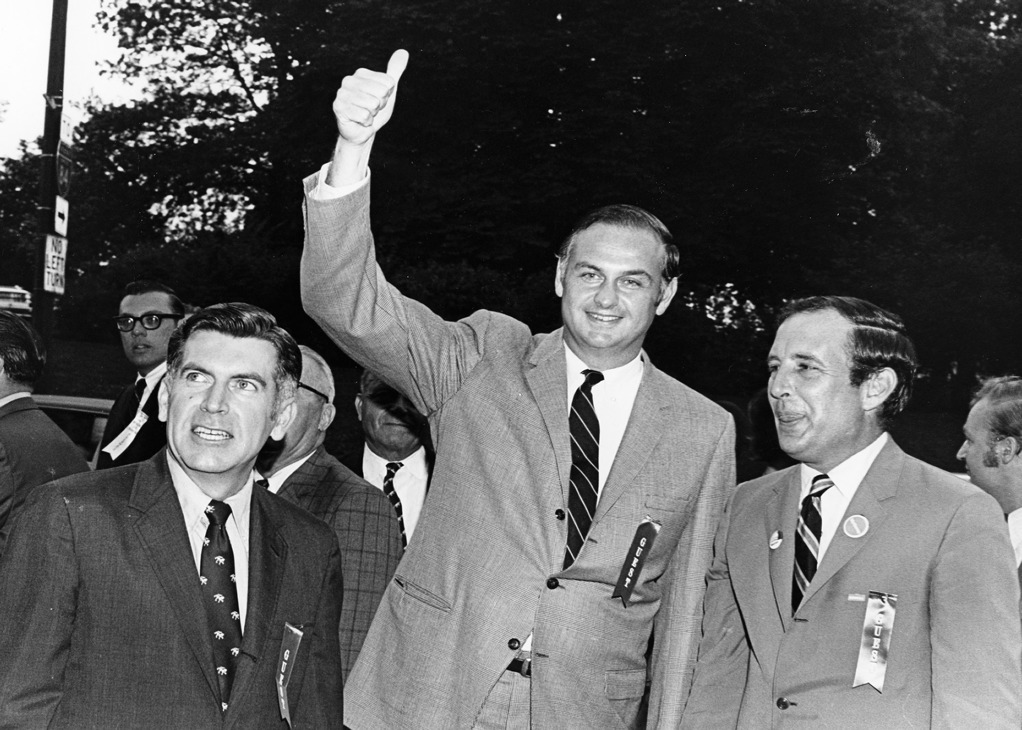
Lowell Weicker’s Victories Dashed The Hopes of Liberal Democrats Throughout His Career
Reflecting on the Politics of Connecticut’s Three-Term Senator and One-Term Governor
By John McNamara
The first time I and many viewers (outside CT) saw and heard Lowell P. Weicker was watching the U.S. Senate Watergate Committee hearings in 1973. I was paying attention every day from my perch in the newsroom of the Lynn Sunday Post where Weicker’s colleague, Ted Kennedy, came annually to visit the paper in the North Shore Massachusetts city.

The networks’ airing of the Watergate Committee made it must-see television for anyone within range of a set, riveted as the nation was by the unraveling of Richard M. Nixon’s Presidency.
NB Politicus Blog
Then a first-term U.S. Senator, Weicker was one of three Republicans on the seven-member select committee led by the two Southern senators, Sam Ervin and Howard Baker. Republican Baker may own the most famous line from those hearings (“What did the President know? And when did he know it?”). But Weicker, who campaigned for Nixon’s re-election in 1972, stood out: “Republicans,” he said, “do not cover up. Republicans do not go ahead and threaten. Republicans do not go ahead and commit illegal acts. And, God knows, Republicans don’t view their fellow Americans as enemies to be harassed.” That set off the chain of events that led to Nixon’s resignation in August, 1974.
Weicker, who died June 28th at age 92, was one of the last of the liberal Republicans in Congress, “a Jacob Javits Republican“, as was noted by ex-Senator Chris Dodd at Weicker’s funeral July 10th who said Javits “in many ways was the senator he emulated the most.” The Connecticut Republican found common ground with Ted Kennedy, Tom Harkin, Dodd and other Democrats of that era in defending the Great Society against Nixon impoundments of the 1970s and trickle-down Reaganomics of the 1980s. He stands with Iowa’s Harkin for enactment of the Americans With Disabilities Act that became law shortly after Weicker left office.
The photos of Lowell Weicker’s early political career appearing in this post are the work of Frank Gerratana, a longtime photojournalist and Chief Photographer for The Bridgeport Sunday Herald. During his career Gerratana photographed every U.S. President from Franklin Delano Roosevelt to Richard Nixon and his archives provide a pictorial history of CT politics. Courtesy of Dr. Frank Gerratana)
Through the years Democrats increasingly respected Weicker for his liberal ways in the Senate and as the Governor who established the state income tax. “He came to the conclusion that Watergate was wrong and the (state) income tax was right.” eulogized Governor Ned Lamont at the July 10th funeral. In recent years the admiration among libs only grew stronger when Weicker left the Republican Party, denouncing the party’s embrace of Trumpism.
Ironically Weicker notched his biggest wins against three liberal Democrats in two Senate runs (1970 and 1982) and in his independent run for Governor (1990).
He came to the Senate via a three-way contest in 1970 as the Nixon-backed Republican opposing the Democratic nominee and anti-war activist Joe Duffey and incumbent Democrat Tom Dodd. The elder Dodd ran as an independent after the party denied him re-nomination over charges that he misused campaign funds. The Nixon-backed Weicker used the Democratic rift to gain a 42 percent plurality win. Duffey (33.79%) and Dodd (24.46%) split the majority of voters.

Twelve years later came Cong. Toby Moffett, the one-time leader of Ralph Nader’s Connecticut Citizen Action Group and a strong challenger. Weicker won, however, getting a fraction over 50 percent and holding off a good number of Republicans who wanted him ousted, picking up moderate Democrats uncomfortable with the very progressive Moffett.
In 1988, Joe Lieberman, the Attorney General from New Haven, turned the tables. By a few thousand votes he narrowly edged Weicker in a contest remembered for its negative ads attacking Weicker for missing Senate votes and hawkish redbaiting by Lieberman over Cuba policy. Weicker accurately countered that Lieberman was a liberal disguised as a conservative. Lieberman, a darling of progressive Democrats, turned right that year, pushing Cold War militarism and getting the endorsement of William F. Buckley, Jr., the conservative who loathed Weicker, a political rival of Buckley’s brother. The Liberal Lieberman, still retaining lots of labor and big city Democratic support, figured he couldn’t beat Weicker sticking to his roots and took advantage of Republicans unhappy with Weicker’s liberal, go-it-alone ways.
Eight years out of the Senate, Weicker re-emerged in 1990 in an independent run for Governor under his A Connecticut Party banner amid the debate over the state’s broken tax system and red ink budgets. At issue was whether the state should have a state income tax Weicker famously said during the campaign that an income tax would be like “pouring gasoline on a fire” joining Republican nominee John Rowland in his first run for Governor opposing the income tax. Bruce Morrison, the liberal who rose to Congress as a New Haven legal aid attorney, was the Democratic nominee. Morrison sought to protect vital services and the safety net by taking an ill-conceived position that the question of an income tax should be put to a referendum, something that Connecticut never does. For that Democrat Morrison was buried at the polls barely getting over 20 percent. Weicker, like his plurality in the 1970 Senate race, narrowly won at 40.4 percent to Rowland’s 37.5 percent.
In a 1995 New York Times review of Weicker’s book, Maverick, the Journalist Jeff Greenfield wrote that Weicker found “a perfect title for his political memoir. Originally used to describe unbranded cattle, the word now defines a politician who wears no label, who marches to a distinctly different drummer and who generally drives members of his own party to apoplexy.”
Running as a Republican, however, Weicker scored his biggest victories over liberal Democrats Duffey, Moffett and Morrison.
In his book, Weicker, who ultimately ran with “no labels” for Governor, shared his disdain for the two-party system in which he rose to power by asserting “good riddance to bad rubbish.”
That disdain accounted for his often used campaign slogan “nobody’s man but yours” that ultimately upended Republicans on the right and Democrats on the left.




